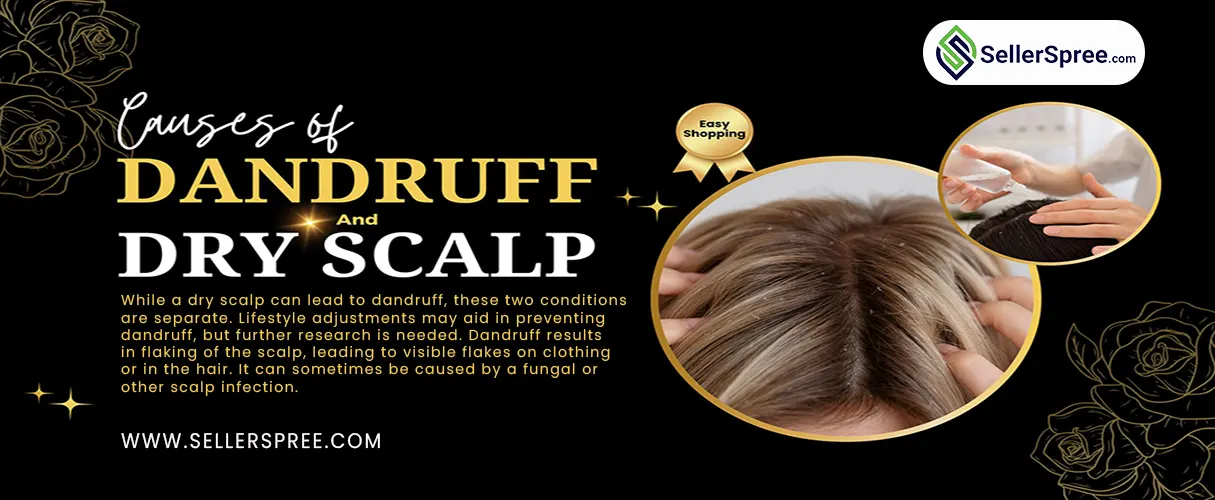
Shop on: www.sellerspree.com
While a dry scalp can lead to dandruff, these two conditions are separate. Lifestyle adjustments may aid in preventing dandruff, but further research is needed. Dandruff results in flaking of the scalp, leading to visible flakes on clothing or in the hair. It can sometimes be caused by a fungal or other scalp infection. Conversely, dry scalp occurs when the scalp lacks sufficient moisture production or retention. Knowing the distinction between dandruff and a dry scalp can assist in selecting the appropriate treatment.
Causes Of Dandruff And Dry Scalp
Dry Scalp
A dry scalp develops when there is an inadequate amount of oil to keep the skin lubricated. This can lead to itching, flaking, and irritation, similar to other forms of dry skin. Additionally, dry scalp can make the hair appear dry, as the scalp’s oil helps condition the hair. Individuals with dry skin are more susceptible to developing a dry scalp, meaning factors that contribute to dry skin, such as dry air (especially during winter), excessive washing, and skin conditions like eczema, can also cause a dry scalp.
Dandruff
Dandruff develops when the scalp sheds dead skin cells at an accelerated rate, much like the rest of the skin. These flakes are essentially dead skin cells. The severity of dandruff increases with the speed of this shedding process. Several factors can influence the rate of skin shedding.
Although the exact cause of dandruff remains unclear, potential factors identified by the American Academy of Dermatology include fungal infections of the scalp, scalp oil secretion, and sensitivity to substances like hair products.
These factors can synergistically exacerbate dandruff. For instance, individuals with fungal scalp infections may experience worsened dandruff if they also have sensitive skin or an excessively oily scalp.
Many individuals have a fungus called Malassezia on their scalp without any issues. However, in individuals with dandruff, this fungus can lead to irritation and flaking. This irritation may be attributed to the interaction between the fungus and other contributing factors.
Symptoms
Individuals with a dry scalp may observe small, white flakes shedding from their scalp. In contrast, dandruff flakes are larger and may appear yellowish or oily. While both dandruff and dry scalp can fluctuate over time, dandruff stemming from a fungal infection typically requires treatment to improve. Conversely, dry scalp may benefit from less frequent shampooing.
Both conditions can lead to scalp itchiness and irritation. In severe cases, individuals may scratch their scalp excessively, leading to redness or the development of small sores.
Differences Between Dandruff And Dry Scalp
Differentiating between dandruff and a dry scalp can be challenging, as it’s possible to have both conditions. Generally, flakes are more likely to be dandruff if:
- The scalp feels oily
- There is intense scalp itching even without dryness
- The hair looks greasy
Treatment Options
Most cases of dandruff can be effectively treated at home. Individuals with dandruff should use anti-dandruff shampoo regularly to manage the condition. This type of shampoo can address many underlying causes of dandruff, including minor fungal infections.
Anti-dandruff shampoos often contain pyrithione, and a wide variety of options are available online. Another treatment option is coal tar shampoo, although it may alter the color of light hair, so individuals with blonde or gray hair may prefer an alternative.
Dandruff shampoos can have a strong odor. Some individuals may choose to alternate between dandruff shampoo and regular shampoo, or use a different shampoo immediately after using dandruff shampoo.
For those who prefer natural remedies or dislike the smell of dandruff shampoo, tea tree oil shampoo is a possible alternative, as tea tree oil has antimicrobial properties.
If dandruff does not improve with home treatment, it is advisable to consult a doctor. Identifying the underlying cause of dandruff, which could be a bacterial or fungal infection, can be beneficial. In such cases, prescription-strength treatments are often effective in clearing up dandruff.
Prevention
Contrary to popular belief, dandruff is not caused by poor hygiene. However, infrequent shampooing can make dandruff more noticeable.
Since researchers have yet to fully understand the exact cause of dandruff, it remains uncertain whether it can be prevented.
Dandruff is often a recurring, chronic condition. While some individuals believe that lifestyle changes can alleviate their symptoms, there is limited research on this subject.
To potentially prevent dry scalp, consider:
- Using shampoos that are less likely to irritate the scalp
- Switching to a moisturizing shampoo
- Shampooing less frequently
- Using a humidifier to prevent dry skin
- Increasing water intake
TAGS: SellerSpree, Dandruff Hair Treatment, Best Shampoo, Hair Color, Beauty Supplies, Salon Supplies, Barber, Cosmetologist Supplies, Cosmetics, Hairspray, Dry Shampoo, Conditioner, Permanent Hair Dye, Semi Permanent Hair Dye, Creams, Moisturizer, Serum, Buy Online, Shopping, USA
